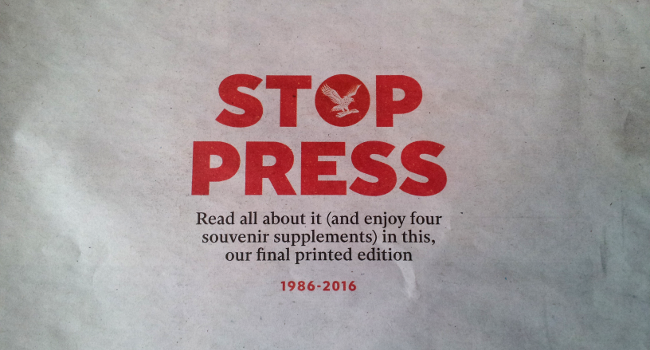Should a real press regulator ever be set up in this country, its first rule should be that any paper found to be puffing itself like a political or corporate dispatch will be abolished on sight.
Most would not last the day, windbaggery being a practice most editors and proprietors enjoy even as the grunts on the newsdesk wipe tears from their eyes as they extract the sliver of meaningful information from another slew of press releases.
It’s this practice that leaves a bitter taste in the mouth as one leafs through the last paper edition of the Independent, still the last full-blooded national ever launched in Britain (New Day and the i being cheap-sheets) after 30 years.
Chief among the elisions is the attempt to spin the collapse in hard-copy sales as some kind of “bold transition”, rather than a shift foisted on the company by a collapsing market.
More than this is the lack of acknowledgement that the Independent ceased to be after it was bought up by its current proprietors the Lebedevs in 2010
The closeness of Evgeny Lebedev, son of Alexander, to Tory politicians like Boris Johnson famously compromised the paper on the eve of the last general election, leading the Indy to back a Tory-Lib Dem coalition despite the fact far more of its readers (and many of its journalists) backed Labour.
Yet even without that explicit case, the purchase by the Lebedevs was a betrayal of the founding values of the paper. As described by Andreas Whittam Smith, founding editor of the Indy, in a piece today exploring the history of the paper:
“[The Indy’s founding document argued] journalism of the highest standard could not easily flourish when impeded by the restrictive practices of the printing trades unions or by the political prejudices of the typical newspaper proprietor.”
Lebedev the younger can be found in the pages of Private Eye regularly inserting self-aggrandising pieces into the news agenda – a practice even the likes of the Telegraph-owning Barclay brothers defer from. (Rupert Murdoch of the Times, not so much.)
It is true that the Indy did usher in some bold changes to British journalism, its greatest success being the i, whose sales figures are cynically included in Lebedev’s own summary of the Indy’s growth since he took over the paper, despite many crediting the cheap-sheet with undermining the main title whilst relying on its resources.
The i is being sold off to Johnston press for some £24m. Some 100 staff are also due to be laid off as the Indy shifts its efforts to the digital sphere, according to a report from No. 1412 of Private Eye.
A number of staffers have even been going freelance over the past couple weeks, either unconvinced of their chances of a job under the reorganisation or unwilling to write for the more clickbait-oriented online offerings.
(The most popular article on i100, a “seriously addictive” news subsection, is currently “Everyone loves this guy’s parody racist Facebook status”.)
All of this is perhaps harsh. The media business has rarely been a profitable one, and the last decade has been particularly hard as tech companies gorge themselves on the advertising revenues that kept many papers aloft in times gone by.
The Indy, despite its stated neutrality, has long swung more leftwards than right, and for some reason lefties buy papers in fewer numbers than their political opponents.
Even so, the paper has its share of great pieces, and will no doubt continue to produce them. In the last edition of the Indy Howard Jacobson, a columnist of 18 years, penned perhaps the greatest sign-off in the history of the medium.
In news, the good must be taken with the bad.
Image Credit – Independent final edition, March 2016 by Jimmy Nicholls
